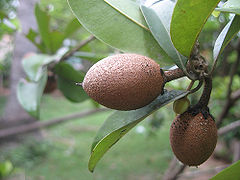Sapodilla
| Infobox on Sapodilla | |
|---|---|
| Example of Sapodilla |  |
| Freshness facts | |
| Optimum carrying temperature | 12°C to 16°C° |
| Highest freezing point | - |
| Acceptable product temp. at loading into containers | Max. 2°C above carrying temperature |
| Optimum humidity | 85%-90% |
| Ventilation setting for containers | 25 m³/hr |
| Storage life | 2-3 weeks |
| Climacteric / non-climacteric | Climacteric |
| Ethylene production | Very high |
| Ethylene sensitivity | High |
| Modified / controlled atmosphere | See text |
| Potential benefits | - |
| Availability | |
| On demand | |
Sapodilla
Contents
Harvesting and handling
The Sapodilla fruit is a fleshy berry, ellipsoidal, conical or oval, and contain one or several shiny black seeds. It has a dull brown colour and thin skin and yellowish light brown or red pulp. Sapodilla fruit are prized for pleasant aroma and sweet taste. The fruit are very susceptible to mechanical injury.
The optimum harvest time is difficult to determine. Full mature fruit will have a brown skin, and fruit will separate easily from the stem without leaking latex. Extent of scurfiness is also a good indicator of maturity. A fruit with a smooth surface, shining potato colour and rounded styler end is considered mature.
Fruit harvested later than optimum time usually soften very rapidly and become very difficult to handle. Fruit harvested earlier than physiological maturity may not soften, are usually low in sweetness and high in astringency when ripe, with a rather unappealing alcoholic aftertaste, and form pockets of coagulated latex that lower quality.
Cooling and storage
Postharvest life is 2 to 3 weeks at 12°C to 16°C with 85% to 90% relative humidity. Storage life of sapodilla is extended by use of MA and removal of ethylene. Storage in 5% to 10% CO2 enriched atmospheres delays ripening. Sapodilla fruit are highly susceptible to chilling injury. Storage of fruit at 6°C to 10°C causes irreversible damage and results in poor flavour.
Mixed loads
Sapodilla fruit are sensitive to ethylene; do not ship with other ethylene-producing commodities.
Cautions
Avoid chilling temperatures (below 12°C). Exposure to CO2 concentrations of >10% may damage the appearance and taste of sapodilla.
Storage disorders
Chilling injury, Phytophthora, Pestalotiopsis, Phomopsis.











